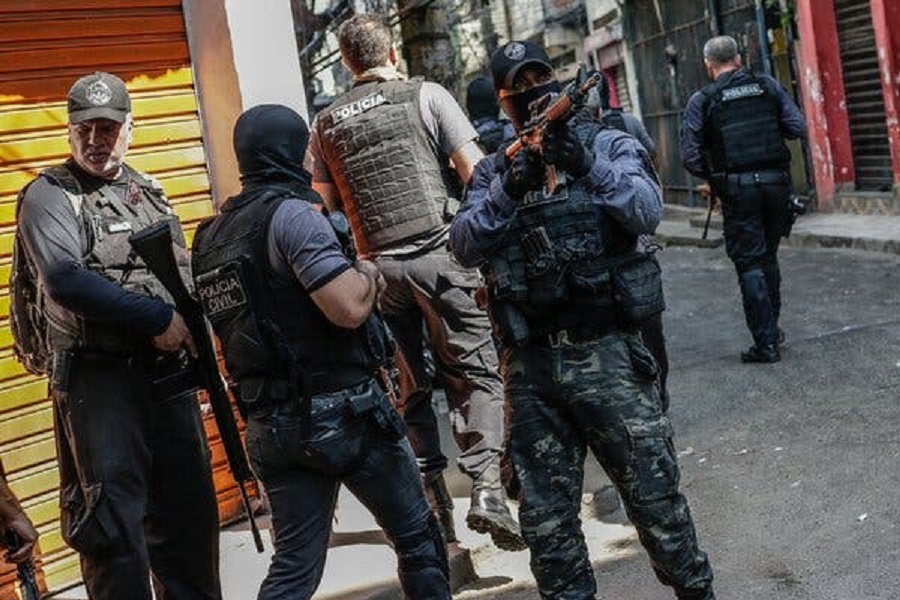RIO DE JANEIRO, BRAZIL – One year and 5 months after the historic Supreme Court decision to restrict non-urgent police operations during the pandemic in Rio de Janeiro – and although the state government did not fully comply with ADPF 635, especially as of January 2021 – the injunction’s results are positive and the number of shootings during police actions and operations in Greater Rio de Janeiro has dropped.
Since ADPF 635, also known as the ADPF for Favelas, became effective, 1,693 shootings occurred in police actions and operations in the Metropolitan Region of Rio, according to the Fogo Cruzado Institute. A drop of 38% compared to the 1 year and 5 months before the ADPF came into force, when 2,715 shootings were recorded.

According to a Group for the Study of New Illegalities (GENI/UFF) report published in June this year, there is a clear difference between the times of compliance with ADPF 635 in Rio de Janeiro. In the so-called period of Relative Obedience (between June and September 2020), there was a drop in the monthly average of police operations (-18.7) and, consequently, of deaths as a result of these actions (-37.7).
However, what is currently being experienced in the state is what the study refers to as a period of defiance; the number of operations has increased again and, consequently, the number of deaths.
“Despite the Rio de Janeiro government’s clear violation and defiance of the Court’s decision, the effectiveness of the injunction has reduced the main indicators of armed violence in Greater Rio de Janeiro, showing that the measure is saving lives,” says Fogo Cruzado Institute executive director Cecília Olliveira.
“It took the Federal Supreme Court’s (STF) intervention to force the state of Rio de Janeiro to comply with the Constitution and abandon harmful policies that endanger people’s lives, violating its constitutional duty to preserve them. Now, with the COVID-19 pandemic nearing a possible end, citizens of Rio de Janeiro need the positive balance achieved by ADPF 635 to be sustained,” she reiterates.
FEWER POLICE OPERATIONS, FEWER SHOOTINGS, FEWER VICTIMS
Since ADPF 635 came into force, there has been a 35% drop in the number of deaths (769) and a 33% drop in the number of wounded (912) in shootings resulting from police actions and operations, compared with the 1 year and 5 months prior to the ADPF, when 1,178 were killed and 1,353 wounded. On the other hand, the Rio de Janeiro Institute for Public Safety shows that one of the great concerns of those who opposed the Supreme Court’s decision – that the measure would lead to impunity – was not confirmed.
However, Harvard research indicates that crimes such as robberies and thefts or attacks on police officers have not become more common. Drug seizures, the most frequent motive for police operations in favelas, have hardly changed.
There has also been a significant reduction in killings during this period. There were 57 killings resulting from police actions and operations that left 238 people dead. A reduction of 30% and 23%, respectively, in comparison to the previous period, when 82 killings resulting from police actions and operations resulted in 309 deaths.
In violation of the ADPF, a civil police operation ended with 28 dead and 3 wounded, making it the largest police operation killing in the history of Rio de Janeiro.
“The operation was reported to the Prosecutor’s Office 3 hours after it began, and not before, as provided for by the ADPF. People were killed in front of children, the crime scenes were disrupted, 3 people were victims of stray bullets, and police officers are now being investigated for procedural fraud. This kind of operation, generic, ‘against drug trafficking’, shows that police action is ineffective, both from the utopian standpoint of putting an end to crime and not caring about their own staff: a police officer was killed and 2 others injured. An action based on intelligence would spare the lives of residents, subway users and also of police officers. But this is not a concern,” Cecília Olliveira notes.
A survey conducted in 2019 by Datafolha at the request of the Brazilian Public Safety Forum showed that the majority of Rio de Janeiro residents fear being victims or having relatives fall victim to stray bullets. The decrease in non-emergency police operations during the pandemic also reduced the number of victims in these circumstances: it dropped from 44 deaths to 28 and from 121 to 68 wounded by stray bullets in these circumstances.
DELAYED TRIAL
Organized civil society is eagerly awaiting the resumption of the appeal case on ADPF 635 by the Federal Supreme Court, suspended last May after Justice Alexandre de Moraes requested to examine the report.
With the trial’s imminent resumption, it is expected that new measures will expand the positive impacts of the ADPF for Favelas. And moreover, that the STF’s decision to suspend non-urgent police operations be upheld and maintained even after the end of the Covid-19 pandemic, in order to spare lives and ensure the safety of the population.
“It is urgent to create a safety plan to prevent that poorly executed actions and operations affect the routine of citizens and stop the population from being victims of violence. Only then we will be able to inspect if it is being complied with and how,” Cecília Olliveira adds.
ABOUT FOGO CRUZADO
Fogo Cruzado is an Institute that uses technology to produce and publish open and collaborative data on armed violence, strengthening democracy through social transformation and the preservation of life.
With its own innovative methodology, the institution’s data laboratory produces more than 20 unprecedented indicators on violence in the metropolitan regions of Rio, Recife, and soon in more Brazilian cities.
Through a cell phone app, Fogo Cruzado collects and provides information about shootings, checked in real time, in the only open database on armed violence in Latin America, which can be accessed for free through the Institute’s API.

